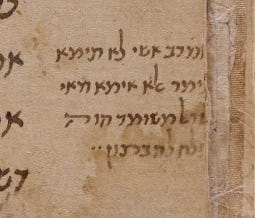The Censored Meshumad
In yesterday’s daf, Avodah Zarah 54a, there was a section about compelled idol-worship, and whether the Jew’s compulsory worship would render items forbidden.
אֲמַרוּ לֵיהּ רַבָּנַן לְרָבָא: תַּנְיָא דִּמְסַיְּיעָא לָךְ, בִּימוֹסְיָאוֹת שֶׁל גּוֹיִם בִּשְׁעַת הַשְּׁמָד — אַף עַל פִּי שֶׁהַשְּׁמָד בָּטֵל, אוֹתָן בִּימוֹסְיָאוֹת לֹא בָּטְלוּ.
The Rabbis said to Rava: That which is taught in a baraita supports your opinion. It is taught in a baraita: The following halakha applies with regard to platforms of gentiles that were used for idol worship in a time of religious persecution, when gentiles decreed that Jews must engage in idol worship. During a time of religious persecution, one is required to sacrifice his life rather than transgress the prohibition against engaging in idolatrous worship even in private. Therefore, even though the religious persecution was canceled, the status of those platforms is not revoked and they remain forbidden, despite the fact that the idol worship was performed under duress.
אֲמַר לְהוּ: אִי מִשּׁוּם הָא לָא תְּסַיְּיעַן, אֵימַר יִשְׂרָאֵל מְשׁוּמָּד הֲוָה וּפְלַח לַהּ בְּרָצוֹן. רַב אָשֵׁי אָמַר: לָא תֵּימָא ״אֵימַר״, אֶלָּא וַדַּאי יִשְׂרָאֵל מְשׁוּמָּד הֲוָה וּפְלַח לַהּ בְּרָצוֹן.
Rava said to the Rabbis: If one wishes to support my opinion due to that baraita, you cannot support my opinion, as one can say that perhaps there was an apostate Jew there and he worshipped the idol willingly, and therefore the platforms are forbidden. Rav Ashi says: Do not say that one can say it is a possibility; rather, it is certain that there was an apostate Jew there and he worshipped it willingly.
Now, Artscroll follows the censored Vilna text and has בִּשְׁעַת הַגְּזֵרָה in both the gemara and Rashi. However, square brackets guy, who is more academically oriented and likes to quote Dikdukei Soferim, follows Dikdukei Soferim to note in a footnote that the word is really הַשְּׁמָד, but the Christian censor forced the change.
Here are the printings, so that we can see that it is only Vilna that does this:
and here are the manuscripts, so that we can see that this was the long-standing text.
One thing that the square brackets commentators does not mention is that there are several censored words in this passage, e.g. the ovedei kochavim instead of goyim that I have mentioned before. But the important censored phrase is יִשְׂרָאֵל מוּמָר instead of the original יִשְׂרָאֵל מְשׁוּמָּד. This ties the text together — during shmad, there is certainly an Israelite who has apostatized and because a meshumad.
By the way, the JTS 15 manuscript has an interesting omission, of Rav Ashi’s statement. Rav Ashi either is arguing with Rava, or else is acting as a redactor to establish the proper Talmudic text, to say that, in repeating Rava’s statement, לָא תֵּימָא ״אֵימַר״, but rather say וודאי.
Regardless, this omission is supplied in the margins.
Presumably this is just fixing a careless omission, either made just at the time, or from an earlier version of the text and corrected from another text. If the latter, we could speculate that there were these two Talmudic versions, with the Suran version having Rav Ashi’s correction and perhaps the Pumbeditan version without.
I probably wouldn’t have posted this as a stand-alone, but once we are on the page, we have this on Avodah Zara 54b:
וְהַיְינוּ דְּאָמַר רֵישׁ לָקִישׁ: אָמַר הַקָּדוֹשׁ בָּרוּךְ הוּא: לֹא דַּיָּין לָרְשָׁעִים שֶׁעוֹשִׂין סֶלַע שֶׁלִּי פּוּמְבֵּי, אֶלָּא שֶׁמַּטְרִיחִין אוֹתִי וּמַחְתִּימִין אוֹתִי בְּעַל כׇּרְחִי.
The Gemara comments: And this is as Reish Lakish says: The Holy One, Blessed be He, said: Is it not enough for the wicked that they treat My die for a sela coin as if it were ownerless [pumbi], using it without My permission and against My will, as they impregnate women adulterously? But moreover, they also trouble Me and cause Me to sign the result of their actions against My will, as I form the fetus and give it life, even when its creation is the result of prohibited sexual intercourse.
Rashi sees the word וְהַיְינוּ דְּאָמַר and thinks: “well, where did Reish Lakish say this?”
ומיבעיא לי היכא איתמר דריש לקיש ובאיזה מקרא הוא דורש קבלה זו שהקב"ה קובל על כך ובתנחומא דריש מאותו פסוק צור ילדך תשי וגו':
I really appreciate this approach. He points to Tanchuma for the general derasha, of Hashem marking against His will, but I don’t think it is exactly the same thing. Also, Reish Lakish doesn’t appear here.
In terms of וְהַיְינוּ דְּאָמַר, I see two possibilities:
I am not sure that we need to look outside the Talmudic corpus for this. Much like vehavinan bah, I wonder if there were more sugyot that somehow did not survive until today. Thus, it did exist elsewhere in Shas but we no longer can point to it.
I am not sure that I would personally understand וְהַיְינוּ דְּאָמַר in the same way as vahavinan bah; or in the same was as kedeReish Lakish deAmar Reish Lakish. Those are allusions to other sugyot, and we can often indeed find the primary sugya. Here, I can see it read as saying “and this is what Reish Lakish was wont to say.” In that case, the primary sugya is here!




